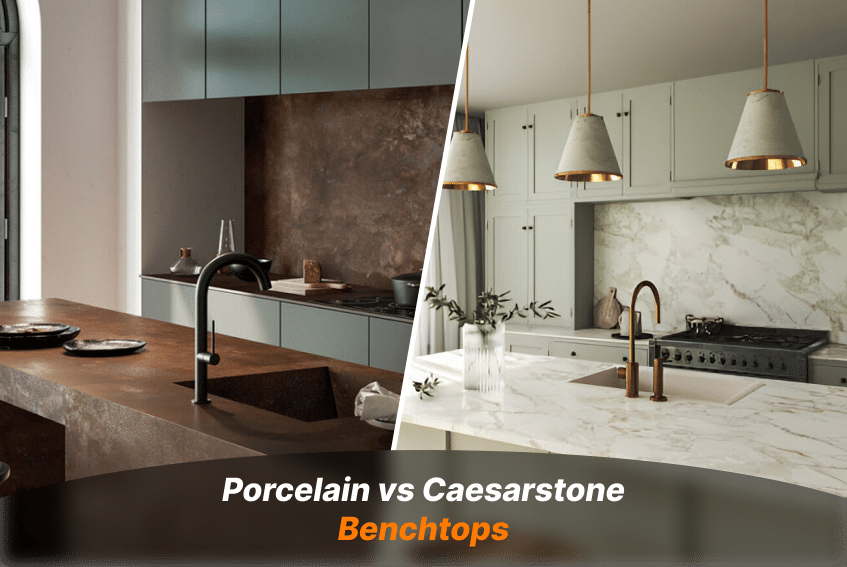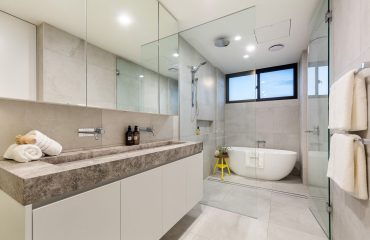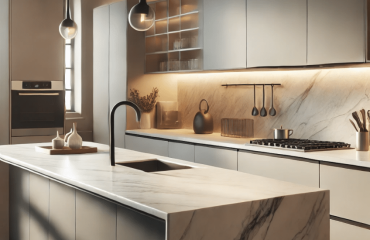Choosing the right benchtop material is one of the most important decisions when designing a kitchen. Two popular choices are Porcelain Benchtops and Caesarstone, which offer unique advantages and aesthetic appeal. Whether you aim for a sleek, contemporary look or a practical, durable surface for daily use, the decision can be overwhelming. In this blog, we’ll compare Porcelain Benchtops vs Caesarstone, focusing on their characteristics, pros and cons, cost considerations, and suitability for Australian kitchens.
Porcelain Benchtops: A Brief Overview
Porcelain Benchtops are made from compressed clay and minerals baked at extremely high temperatures, resulting in a firm, non-porous surface. Porcelain is known for its durability and versatility. It is available in various finishes and colours that mimic natural materials like marble and granite.
Key Features:
- Durability: Highly resistant to scratches, stains, and heat.
- Design Flexibility: Available in a wide range of patterns and finishes, including matte and polished options.
- Low Maintenance: Non-porous surfaces make cleaning simple and sealing unnecessary.
- Lightweight: Easier to handle and install compared to natural stone.
Caesarstone: A Brief Overview
Caesarstone is an engineered stone made from quartz and resins. Its composition creates a highly durable and uniform surface for modern kitchens. Caesarstone is celebrated for its consistent appearance and wide array of colours and textures.
Key Features:
- Consistency: Offers a uniform look, perfect for minimalist or contemporary kitchens.
- Scratch Resistance: Engineered for excellent scratch and chip resistance.
- Customisation: Available in a variety of colours and patterns, including marble-inspired designs.
- Requires Some Maintenance: While durable, it can stain if exposed to harsh chemicals and requires occasional sealing to maintain its finish.
Porcelain Benchtops vs Caesarstone: Pros and Cons
Before making a choice, it’s essential to understand the strengths and weaknesses of Porcelain Benchtops vs Caesarstone.
Porcelain Benchtops Pros:
- Durability: Exceptionally resistant to heat, scratches, and stains.
- Aesthetic Appeal: Mimics natural stone with realistic textures and colours.
- Low Maintenance: No need for sealing; easy to clean with mild detergents.
- Eco-Friendly: Made from natural materials and often recyclable.
Porcelain Benchtops Cons:
- Chipping Risk: The edges may chip under heavy impact.
- Limited Edge Profiles: Fewer customisation options for edge detailing.
- Higher Cost: Generally more expensive than Caesarstone.
Caesarstone Pros:
- Wide Range of Designs: Uniform colours and patterns suit a variety of styles.
- Durability: Highly resistant to chips and scratches.
- Cost-Effective: Typically more affordable than Porcelain.
- Seamless Installation: Slabs are easier to fabricate, resulting in seamless finishes.
Caesarstone Cons:
- Stain Risk: May stain if exposed to strong chemicals or oils.
- Heat Sensitivity: Prolonged exposure to high heat can cause damage.
- Periodic Sealing: Requires occasional sealing to maintain its finish.
Cost Comparison: Porcelain Benchtops vs Caesarstone
The cost of a benchtop can be a significant factor in the decision-making process. Here’s how Porcelain Benchtops vs Caesarstone compare in terms of price:
Porcelain Benchtops:
Prices typically range between $800 and $1,200 per square metre. The cost may increase depending on the brand, thickness, and customisation needs. While Porcelain is pricier upfront, its durability and low maintenance can make it a cost-effective choice in the long term.
Caesarstone:
Caesarstone is generally more affordable, with prices starting at around $500 to $800 per square metre. However, consider the additional maintenance costs and potential repairs over time.
Tip: If you work with kitchen designers in Australia, they can advise you on local pricing trends and help you find the best value for your budget.
Durability and Maintenance
Both materials are known for their durability, but they differ in maintenance requirements:
Porcelain Benchtops:
Porcelain is incredibly hard and resistant to heat, scratches, and stains. Its non-porous nature makes it hygienic and easy to clean. Regular wiping with mild soap and water is enough to keep it looking new.
Caesarstone:
While Caesarstone is also durable, it requires more care to prevent stains and heat damage. Use cutting boards and trivets to protect the surface, and avoid harsh cleaners that may dull its finish.
Aesthetic Appeal
When it comes to design versatility, both materials offer unique advantages:
Porcelain Benchtops:
Porcelain can replicate the appearance of natural stone, such as marble or granite, making it an excellent choice for high-end, luxurious kitchen designs. It also comes in matte and glossy finishes, allowing for a customised look.
Caesarstone:
Caesarstone is known for its consistent patterns and colours, which are ideal for sleek, contemporary kitchens. It offers a range of textures, including honed, polished, and rough surfaces, catering to diverse design preferences.
Environmental Impact
Sustainability is a growing consideration in kitchen design, and here’s how Porcelain Benchtops vs Caesarstone compare:
Porcelain Benchtops:
Porcelain is eco-friendly and often recyclable as it is made from natural clay and minerals. Its long lifespan reduces the need for frequent replacements, making it a sustainable choice.
Caesarstone:
As an engineered product, Caesarstone relies on quartz and resin, which have a higher environmental impact during production. However, many brands are now adopting eco-friendly manufacturing processes.
Which Material Is Right for Your Kitchen?
The choice between Porcelain Benchtops vs Caesarstone ultimately depends on your specific needs, design preferences, and budget:
Choose Porcelain Benchtops if:
- You value durability and low maintenance.
- You prefer a natural stone look without the upkeep.
- You’re willing to invest in a premium material for long-term value.
Choose Caesarstone if:
- You’re looking for a more affordable option.
- You want a consistent, sleek appearance.
- You’re comfortable with occasional maintenance.
Conclusion:
Both Porcelain Benchtops and Caesarstone are excellent kitchen benchtops, offering durability, style, and functionality. While porcelain excels in low maintenance and a natural look, Caesarstone is a versatile, cost-effective alternative with a wide range of design options. When deciding between Porcelain Benchtops vs Caesarstone, consider your lifestyle, aesthetic preferences, and budget.
Ready to transform your kitchen? Contact our expert kitchen designers today for personalised advice and a no-obligation consultation. We’ll help you choose the perfect benchtop material for your dream kitchen.






